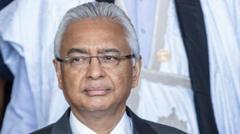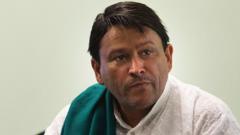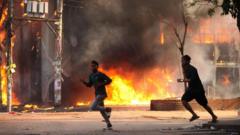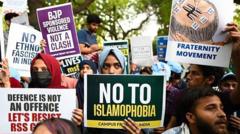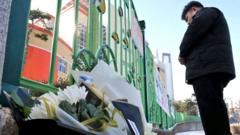As Ecuador approaches a pivotal election, President Daniel Noboa leverages a novel campaign tactic of using cardboard cutouts to enhance his visibility and appeal, despite controversies surrounding his administration. His approach underscores a mix of youthful engagement and a focus on tackling violence and corruption that resonates with voters.
Ecuador’s Unconventional Campaign: The Rise of Cardboard Cutouts in Support of President Noboa

Ecuador’s Unconventional Campaign: The Rise of Cardboard Cutouts in Support of President Noboa
Amid chaos and controversy, President Daniel Noboa maintains his popularity as he faces a critical election with a unique campaign strategy featuring his cardboard likeness.
Ecuador’s political landscape is notably chaotic as the nation anticipates Sunday’s presidential election, yet President Daniel Noboa appears to be an unexpected frontrunner. At recent campaign events, his absence did not overshadow the numerous cardboard cutouts of the 37-year-old leader, which have become an integral part of his election strategy. These cardboard figures, dressed in a variety of attire, including formal suits and casual wear, have popped up across Quito and other cities, signaling Noboa’s presence in a highly personalized manner.
Noboa’s strategy, light on detailed policy proposals and heavy on social media engagement, caters to the younger electorate, many of whom are under 44. His use of these cutouts reflects a savvy understanding of modern communication trends, captivating a demographic eager for representation and dynamic leadership. Supporters have even coined the phrase, “The cardboard is going to win,” suggesting a strong belief in his potential victory despite the adversities facing his administration.
Having only taken office 15 months ago following tumultuous political circumstances, including the ousting of his predecessor over various allegations, Noboa's approach indicates a deep-seated commitment to tackling crime and corruption. This heavy-handed approach to governance, while controversial, resonates with voters worried about safety and integrity within the state.
The anticipated election could serve as a referendum not just on Noboa's leadership but also on the unorthodox methods that have emerged in the political arena. As momentum builds leading to the polls, the effectiveness of these cardboard avatars may very well determine the future trajectory of Ecuador’s governance.




